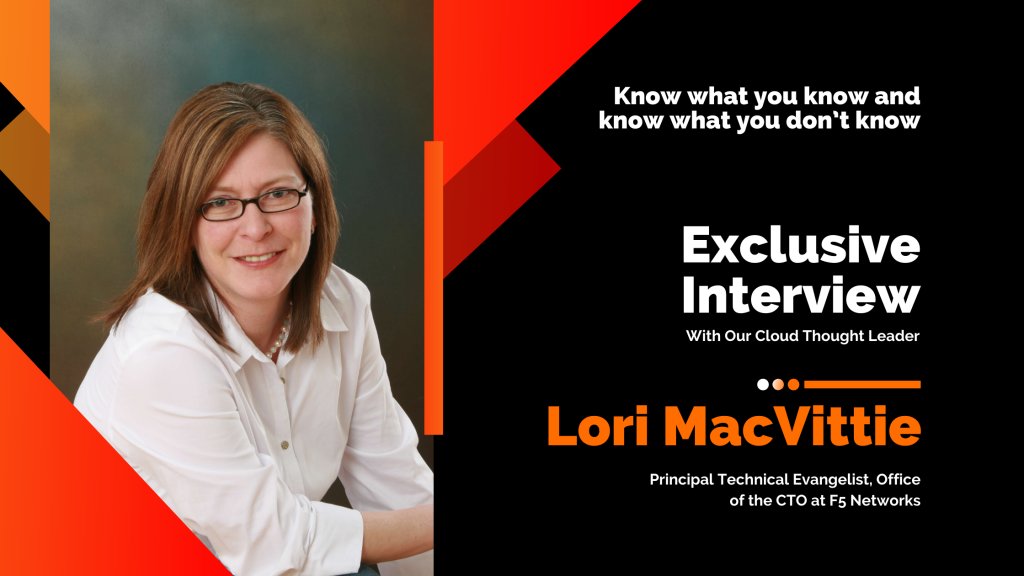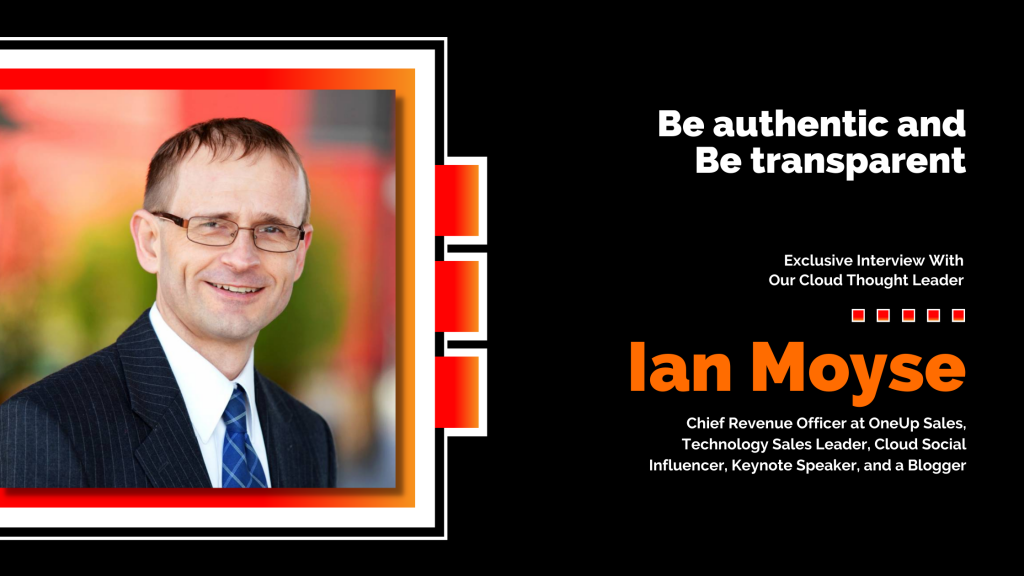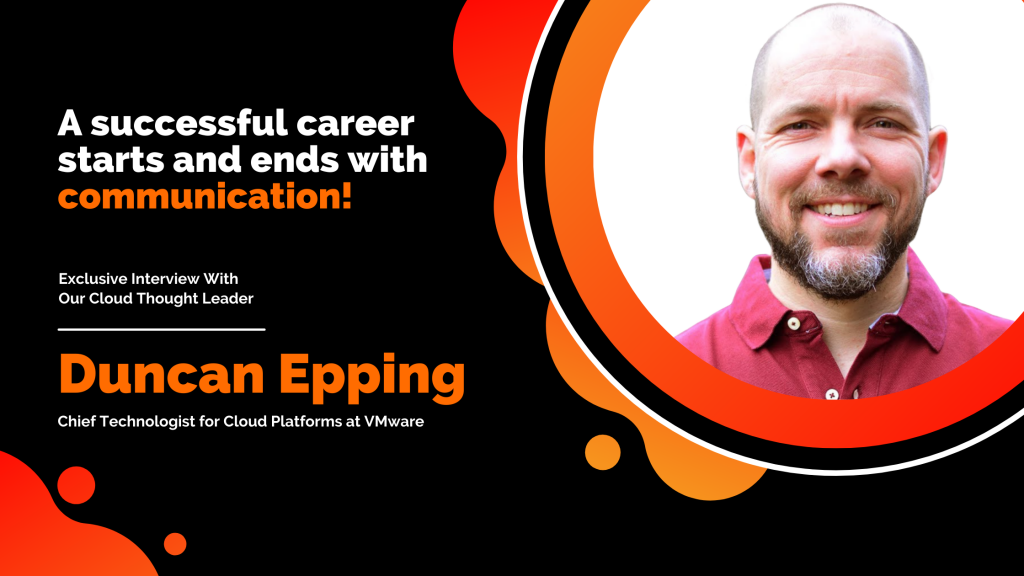Lori MacVittie is the Principal Technical Evangelist at F5 Networks. She has been working with F5 Networks for 14 years and currently she focuses on the applicability of emerging technologies to the change in the target market and industry at large for F5 Networks. One of the trending blogs written by Lori is Will the Emerging Edge Fix My Digital Gaming Experience? and is a must read for everyone who’s interested in knowing the changes made that new cutting edge technology brings into digital games.
Other must read blogs of Lori are The Third Wave of Cloud is Cresting and The Fourth Wave of Cloud is Imminent.
Follow Lori MacVittie on Twitter, LinkedIn, and Blog/Website
From her busy schedule, she spent some of her valuable time answering questions for Whizlabs. Let’s get to know our Cloud Thought Leader a little more today.
1. What was your first job?
My first professional job was as a software developer for a tax software company.
2. How will you describe your journey to become a successful professional in Cloud Computing?
Lengthy. By the time cloud computing arrived, I was focused on technology evangelism. I learn faster and much better by working with technology, so the process took much longer than I would have liked because I had to refamiliarize myself with a lot of supporting technology.
3. When did you actually realize your true love for Cloud Computing?
I don’t think I have, yet. I recognize and appreciate the value of cloud computing in all its forms, but I retain a pragmatic approach to cloud in general. I think my true love for cloud is wrapped up in the passion I hold for helping others discover and leverage the value of cloud, and in finding new and exciting ways to use cloud to enable and empower developers, business, and consumers.
4. Walk us through your journey of first ever certification in the field of cloud computing? How did you make that decision?
Well, now I’m embarrassed to admit the only certification I have ever pursued – and received -was in Java. I haven’t found the time or a need for certification per se. I do often study certification materials for a wide range of technologies because they are some of the best ways to really learn a technology.
5. Globally recognized cloud thought leadership comes with lots of responsibility. What is your advice for your followers?
Know what you know and know what you don’t know. Be ready to be amazed and appreciate the knowledge of others and admit that you aren’t an expert in every domain that’s included in the cloud. There are cloud networking experts, cloud storage experts, cloud security experts, etc. One of the best ways to be a thought leader is to showcase the work of domain experts.
6. Everyone now knows that cloud computing is the future. What do you think?
Oh my, this is a loaded question isn’t it? I don’t think cloud computing alone is the future. I think cloud as a key component of a larger, distributed system is the future. The emergence of edge computing extends the core value of cloud to a new and exciting realm of possibilities. I’ve heard many folks refer to edge computing as “distributed cloud” and, in many ways, that’s an accurate moniker. But from my perspective, “distributed cloud” doesn’t do enough to highlight specific architectural and operational changes needed to enable the successful use of edge computing. The future is highly distributed and data-driven, and that necessitates the use of cloud and edge computing.
7. Anyone who follows you would love to become you (or better than you) at some point, and many of them will be confused on how to start or where to start. Can you share some of the obstacles you have faced at the beginning and the ways you have overcome those?
- Criticism. Putting yourself “out there” constantly, whether in written or verbal form, opens you up to criticism. That’s a huge obstacle for many people, and it can be off-putting. Do it anyway. Even if you’re confident in your ideas, there is always someone who won’t like what you have to say and has no compunction against letting you know – sometimes very rudely.
- Wasted effort. Trust your instincts. More than once I had “a feeling” the content I wrote would not go over well. I have several trusted colleagues who I can share such things with and who aren’t afraid to tell me, “don’t publish that.” And in the trash bin it goes. Don’t be afraid to toss out what you created and start over.
- The biggest obstacles I’ve faced is my own pride and fear, to be honest. If you want to be a thought leader, you must believe in your ideas, and you cannot be afraid to be wrong or encounter resistance. Believe in yourself; have confidence in yourself and your knowledge, and don’t let anyone take that away from you. When you’re right, own it. If you’re wrong, own that, too.
8. A good leader is someone who never stops learning and always willing to un-learn anything if needed. What are your valuable learnings and un-learnings during your journey to a thought leader?
Learning: It’s not personal. People can disagree with your ideas or how you solve a problem without it being a personal attack. When you are passionate about your ideas, you can get overprotective of them and you need to learn to disassociate yourself from your ideas.
Unlearning: You can’t do it all yourself. Early on you think you can, but technology advances quickly outpace your ability to develop the necessary expertise in everything. Building a network of trusted experts is an important part of being a thought leader.
9. In your words, tell us the leadership skills that everyone should learn?
Patience, empathy, and agility. That last one I’ve only recently learned is critical. You have to be willing to shift direction and explore new routes very quickly in technology to adapt to changing business priorities and conditions.
10. What is that one thing which motivates you to become more and more better everyday?
My faith. I am compelled by it to evaluate my actions and motivations every day, identify my failings, and find a way to address them.
Lori’s Favorite quote is “Be quick to listen, slow to speak, and slow to anger.” James 1:19
11. Other than personal learning, what are you currently learning in the technical field? Any new field of interest?
When I was an undergrad, I had decided to follow a path into AI. Back then, AI was something fantastic and only real in the movies or in sci-fi books. The emergence of machine learning and AI (and a son who is now a data scientist) has rekindled that interest and I find myself digging into techniques and innovations in the field quite often. So new, but not so new.
12. If we dare to ask, how would you rate the following cloud providers – AWS, Microsoft Azure, Google Cloud, Alibaba cloud.
Heh. I really shouldn’t and, at the end of the day, I think every cloud provider has a niche capability in which they excel. Organizations that can leverage each cloud provider’s unique value will have an advantage over those that can’t.
Thanks Lori MacVittie for your valuable time! Keep motivating!
- Top 20 Questions To Prepare For Certified Kubernetes Administrator Exam - August 16, 2024
- 10 AWS Services to Master for the AWS Developer Associate Exam - August 14, 2024
- Exam Tips for AWS Machine Learning Specialty Certification - August 7, 2024
- Best 15+ AWS Developer Associate hands-on labs in 2024 - July 24, 2024
- Containers vs Virtual Machines: Differences You Should Know - June 24, 2024
- Databricks Launched World’s Most Capable Large Language Model (LLM) - April 26, 2024
- What are the storage options available in Microsoft Azure? - March 14, 2024
- User’s Guide to Getting Started with Google Kubernetes Engine - March 1, 2024


